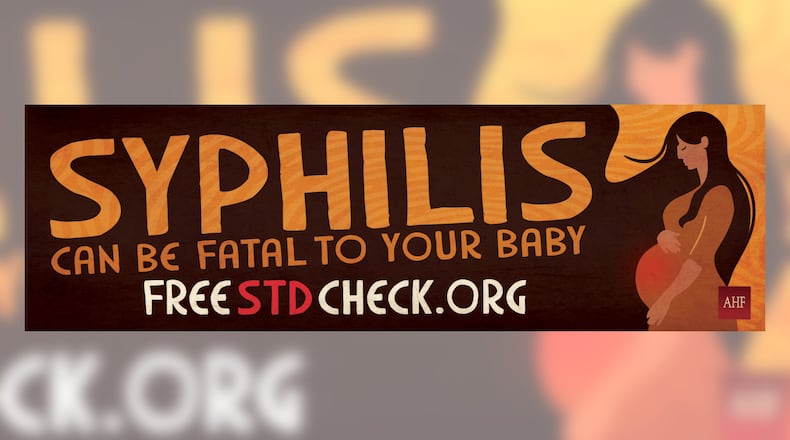Reports that soaring numbers of syphilis cases around the nation are reaching levels not seen since the 1950s are holding true in Georgia as well.
Following historic lows in the early 2000s, data released last week by the Centers for Disease Control and Prevention show rising rates of the disease. Syphilis in mothers giving birth has more than tripled from 2016 to 2022, rising from 87 to 280 per 100,000 births.
Georgia has seen a less drastic rise, but health authorities here say they hope to tackle the crisis via expanded outreach and free testing.
“This is entirely preventable,” Joshua O’Neal, director of Sexual Health, Medical and Preventive Services at the Fulton County Board of Health, told The Atlanta Journal-Constitution. “Nationwide, and in Fulton County, we are seeing increases in mother-to-child transmission of syphilis. We test all women who come in for HIV and syphilis if they are of childbearing potential.”
Syphilis is a sexually transmitted disease (STD) caused by bacteria, and can cause serious health effects if not treated. In pregnant women, untreated syphilis results in infant death in up to 40% of cases. But with one penicillin shot given at least 30 days before delivery, a pregnant woman with syphilis and her baby can be cured of the infection. It’s a message that Atlanta-area health facilities are trying to disseminate widely – online, on billboards, and by word of mouth.
“We want the public to know this is an issue, and you need to be aware of it,” Suzanne Williams, a nurse practitioner at the AHF Healthcare Center - Peachtree, told the AJC. The Los Angeles-based AIDS Healthcare Foundation (AHF) is a global nonprofit organization providing medicine and advocacy. AHF Wellness Centers provide free testing for STDs.
Billboards the AHF has posted in Atlanta and elsewhere aim to support the CDC’s messaging around the deadly infection. The CDC reported 207,255 total syphilis cases in the U.S. in 2022 – an 80% increase since 2018.
Congenital syphilis, which is transmitted from the mother to her fetus, was 10 times higher among newborns than in 2012.
“We are seeing similar increases in Georgia,” Nancy Nydam, a spokeswoman for the Georgia Department of Public Health told the AJC. “But there have been some improvements in our state rates when compared to others in 2022,” she said. Georgia moved up one slot to 20th in the nation for the rate of syphilis infection in the population. The state is 17th in the nation for congenital syphilis, she said.
Syphilis in Georgia stood at 7,225 cases in 2022, up 9% from the previous year. Cases have risen 200% since 2012, according to the Georgia Department of Public Health’s Oasis database. Cases of congenital syphilis rose from 17 cases in 2012 to 101 cases in 2022.
The jump in U.S. syphilis cases “is a tragic outcome,” Rachel Wingard, a spokeswoman with the CDC’s Health Communication Science Office, told the AJC. She said poverty, ongoing declines in prevention infrastructure, and a lack of resources at the state and local level to conduct contact tracing are the main reasons syphilis has returned.
In Atlanta, outreach efforts to end congenital syphilis are being targeted at women who face housing instability, substance abuse, and survival sex work, O’Neal said.
To broaden accessibility, Fulton County Board of Health’s Neighborhood Union Health Center (186 Sunset Ave NW, Atlanta, GA 30314, open 8:30 a.m. to 6:30 p.m. Tuesday-Wednesday and 8:30 a.m. to 5:30 p.m. Fridays) is offering rapid testing for Hepatitis C, HIV, syphilis, and self-swab testing for gonorrhea and chlamydia. Both testing and treatment are free, O’Neal said.
Fulton County hopes to expand free testing and treatment to all centers, but is currently facing budgetary pressures because the U.S. Congress has not yet approved funding for community HIV clinics like those run by the county, O’Neal said.
Pregnant women who seek care at Fulton County Board of Health Centers will qualify for Medicaid immediately, and for one year after giving birth. County officials will help them enroll and access pre- and postnatal care, O’Neal added.
AHF Healthcare Center is also offering free treatment, Williams said. “A complaint is that even with insurance coverage, penicillin injections are $500. We can provide it at no cost,” she said. Another issue had been a nationwide shortage of penicillin, though the FDA aims to boost supplies by importing penicillin from France.
Pregnant mothers must be treated with penicillin because doxycycline – another common antibiotic used to treat syphilis in adults — may harm fetuses.
Nearly 90% of newborn syphilis in 2022 might have been prevented with timely testing and treatment during pregnancy, the CDC said. More than half were among women who tested positive for syphilis during pregnancy, but did not receive adequate or timely treatment, and nearly 40% were among mothers who were not in prenatal care, the CDC said. The CDC estimates syphilis and other STDs cost the U.S. economy $15.9 billion in 2018.
State and federal officials are hopeful that the stepped-up efforts will lower infection rates.
“In the United States, syphilis was close to elimination in the 1990s, so we know it’s possible to reverse this epidemic,” Wingard of the CDC said. “But it’s going to take sustained efforts at the federal, state, and local level.”
What to know about syphilis
Syphilis spreads from person-to-person by direct contact with a syphilitic sore, which can occur in, on, or around the penis, vagina, anus, rectum and lips or mouth. You can not get syphilis from casual contact with such things as toilet seats, doorknobs, swimming pools or sharing clothing.
The infection develops in stages and each stage can have different signs and symptoms, including no symptoms at all.
If left untreated, syphilis leads to serious complications in about 25% of those infected. It can cause serious damage to the brain, heart and other vital organs, as well as blindness, deafness and paralysis.
Source: The Centers for Disease Control and Prevention
About the Author
Keep Reading
The Latest
Featured



